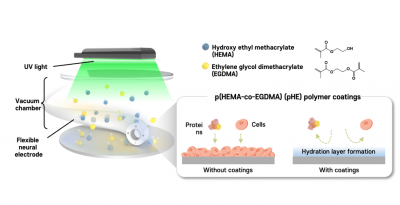Science
Revolutionary Coating Technology Boosts Brain Electrode Lifespan

A research team led by Dr. Hyejeong Seong at the Korea Institute of Science and Technology (KIST) has developed a groundbreaking coating technology that significantly extends the lifespan of implanted electrodes. In collaboration with Prof. Seongjun Park from Seoul National University, the team has increased the duration of effective brain signal recording from approximately 1 month to over 3 months. This advancement could have far-reaching implications for neurological research and treatment.
The innovative coating aims to improve the performance and reliability of brain-computer interfaces (BCIs), which are used to monitor and interpret brain activity. Current electrode technologies often face significant challenges, including degradation and inflammation when implanted in the human body. The new coating reduces these issues, providing a more stable environment for electrodes to function over extended periods.
Dr. Seong, who heads the Brain Convergence Research Division at KIST, emphasized the potential of this technology in revolutionizing the field of neuroscience. “By extending the lifespan of electrodes, we can enhance the quality of data collected from the brain, leading to better understanding and treatment of neurological disorders,” she stated. The research team believes that this development will pave the way for more effective therapies and devices in the future.
The research findings highlight the collaborative efforts between KIST and Seoul National University, showcasing the synergy between academic research institutions in South Korea. Sang-Rok Oh, president of KIST, and Hong-Lim Ryu, president of Seoul National University, both expressed pride in the project’s success. They noted that such advancements are crucial for the ongoing exploration of brain functions and disorders.
As the demand for advanced neurological treatments grows, this innovation may set a new standard in the industry. The ability to record brain signals for longer periods without compromising data integrity is essential for developing more effective brain-computer interfaces. This could lead to enhanced applications in fields ranging from prosthetics to mental health therapies.
The research team is currently preparing to conduct further tests to evaluate the long-term effects of the coating in different environments. They aim to understand how this technology can be adapted for various applications in neuroscience and medical devices. The implications of these findings extend beyond laboratory research and could significantly impact patient care and rehabilitation strategies.
In conclusion, the development of this new coating technology represents a significant step forward in the field of brain signal recording. The collaborative efforts between KIST and Seoul National University underscore the importance of partnership in advancing scientific research. As this technology progresses, it holds the promise of transforming the landscape of neurological treatments and enhancing the quality of life for individuals with brain injuries or disorders.
-

 Science2 months ago
Science2 months agoInventor Achieves Breakthrough with 2 Billion FPS Laser Video
-

 Health2 months ago
Health2 months agoCommunity Unites for 7th Annual Into the Light Walk for Mental Health
-

 Top Stories2 months ago
Top Stories2 months agoCharlie Sheen’s New Romance: ‘Glowing’ with Younger Partner
-

 Entertainment2 months ago
Entertainment2 months agoDua Lipa Aces GCSE Spanish, Sparks Super Bowl Buzz with Fans
-

 Health2 months ago
Health2 months agoCurium Group, PeptiDream, and PDRadiopharma Launch Key Cancer Trial
-

 Top Stories2 months ago
Top Stories2 months agoFormer Mozilla CMO Launches AI-Driven Cannabis Cocktail Brand Fast
-

 Entertainment2 months ago
Entertainment2 months agoMother Fights to Reunite with Children After Kidnapping in New Drama
-

 World2 months ago
World2 months agoIsrael Reopens Rafah Crossing After Hostage Remains Returned
-

 Business2 months ago
Business2 months agoTyler Technologies Set to Reveal Q3 Earnings on October 22
-

 World2 months ago
World2 months agoR&B Icon D’Angelo Dies at 51, Leaving Lasting Legacy
-

 Health2 months ago
Health2 months agoNorth Carolina’s Biotech Boom: Billions in New Investments
-

 Entertainment2 months ago
Entertainment2 months agoRed Sox’s Bregman to Become Free Agent; Tigers Commit to Skubal








